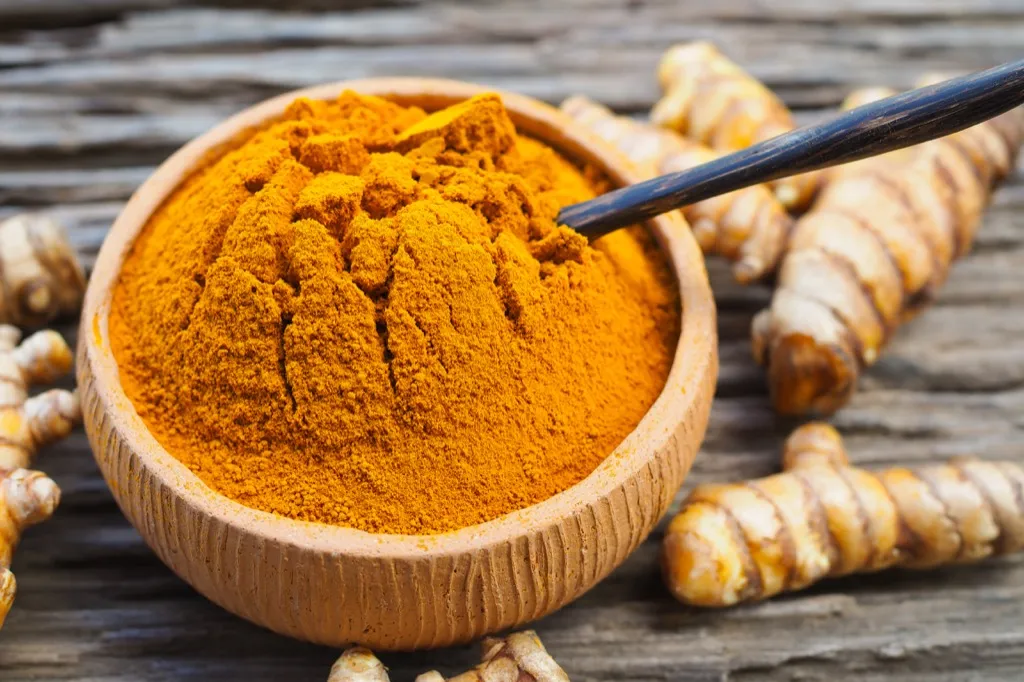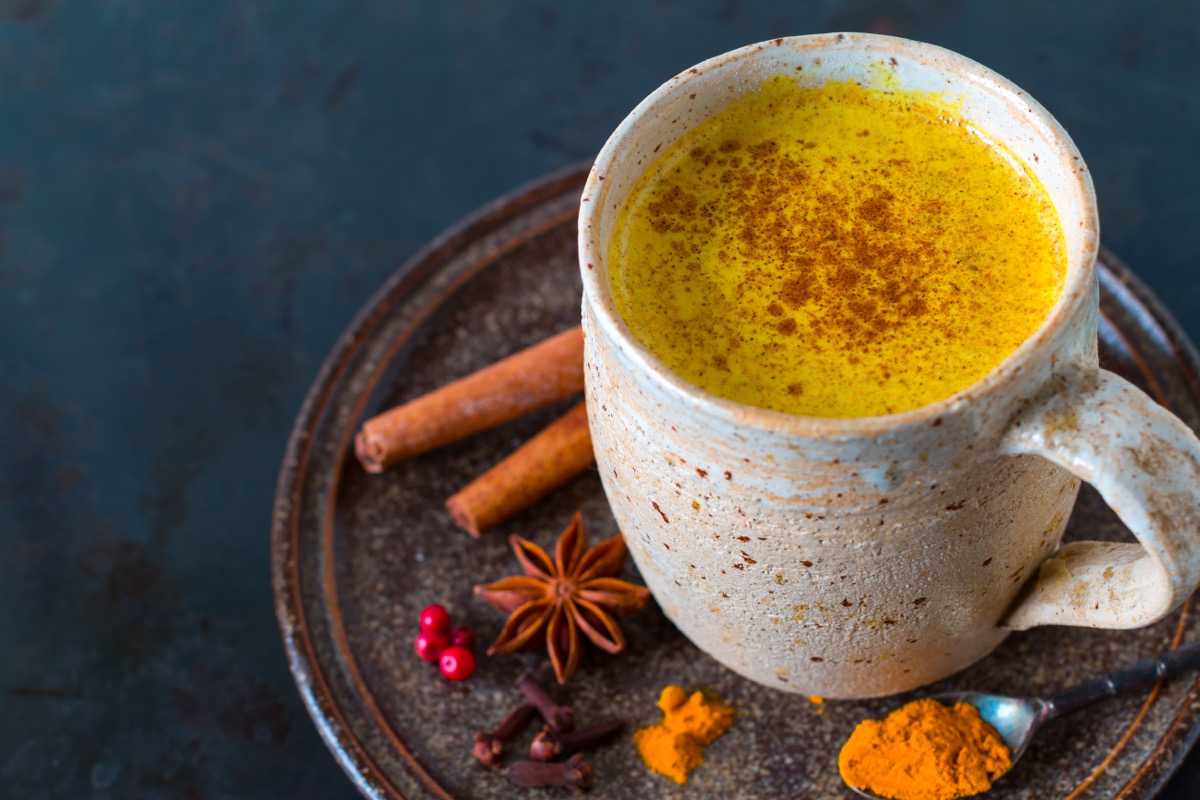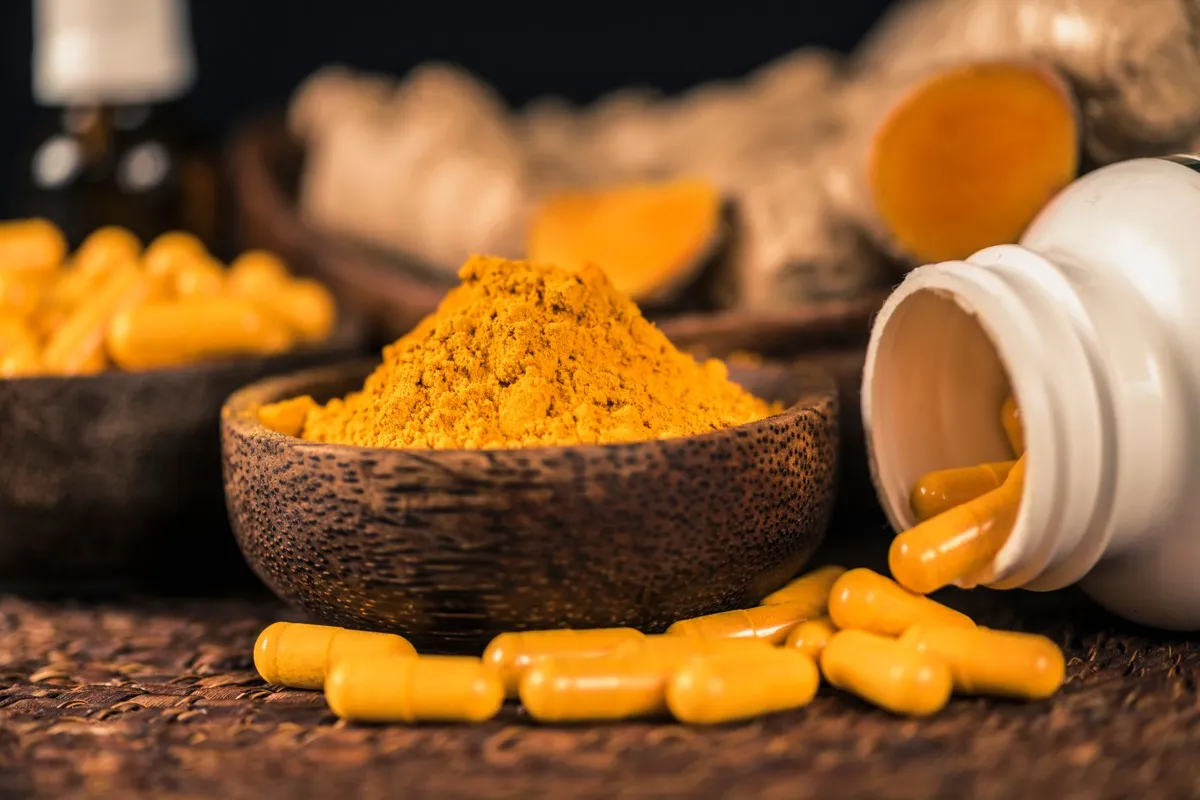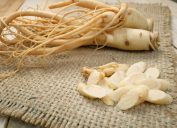5 Surprising Benefits of Taking a Turmeric Supplement Every Day
Doctors share whether it's right for you, and how to best take it.

If you've started seeing turmeric supplements in every health food store and pharmacy, that's because their popularity has skyrocketed over the last several years. Though turmeric benefits are hardly new—it's been used in Ayurvedic and Chinese medicine for over 4,000 years—almost 20 percent of American supplement users over the age of 55 now take a turmeric or curcumin supplement, the 2018 CRN Consumer Survey on Dietary Supplements found.
The enthusiasm isn't expected to die down, either. Valued at $85 million last year, the global market is projected to grow to $205 million by 2032, according to one industry report.
Turmeric can improve your health in several surprising ways, and scientists are still unearthing new turmeric supplement benefits through research. If you're debating taking turmeric yourself, you may be wondering what you stand to gain and whether any risks are associated with taking it as a daily supplement.
While experts agree that turmeric is generally safe at recommended doses, they say there are a few things to consider. These are the five surprising benefits of taking turmeric, the best ways to take it, and how to know whether it's right for you.
RELATED: 7 Surprising Benefits of Taking Magnesium Every Day.
What Is Turmeric?

Turmeric is a spice derived from the root of the Curcuma longa, a flowering plant found natively in South and Southeast Asia. For thousands of years, turmeric has been used for its medicinal properties and as a flavorful cooking spice in South Asian and Middle Eastern cuisines.
In the Western world, turmeric has also emerged as one of the most popular dietary supplements on the market. It is touted as providing a range of health benefits, only some of which have adequate research to support.
Turmeric vs. Curcumin

Curcumin is the main bioactive ingredient in turmeric and what gives turmeric its bright yellow hue. Though turmeric and curcumin supplements are both advertised as being beneficial for your health, some medical experts say that curcumin supplements are far more potent than turmeric supplements and are, therefore, more likely to have a tangible impact.
For instance, the Arthritis Foundation recommends skipping turmeric in favor of high-quality curcumin extract to address rheumatoid arthritis symptoms, noting that curcumin supplements have all the health benefits of turmeric and then some.
One study that analyzed the average curcumin content in high-quality powdered turmeric found that "pure turmeric powder had the highest curcumin concentration, averaging 3.14 percent by weight."
However, it's important to note that for some people, a less potent dose may be preferable due to its lower risk of side effects, which can include stomach upset, nausea, and, in severe cases, stomach ulcers.
"As wonderful as turmeric's nutritional benefits can be, more curcumin is not necessarily better, and too much can be risky," notes Johns Hopkins Medicine.
RELATED: 12 Supplements You Should Never Take Together, Medical Experts Say.
5 Turmeric Benefits
1. Turmeric and curcumin fight inflammation.

Inflammation is a common underlying cause for a range of chronic health conditions. That's the main reason that turmeric and curcumin supplements, which help fight inflammation, may broadly benefit your health.
"Turmeric's most well-known benefit lies in its potent anti-inflammatory properties," says Dev Batra, MD, dual board certified vascular and interventional radiologist at Texas Vascular Institute. "Curcumin, the primary bioactive compound in turmeric, works to combat inflammation at the molecular level. It inhibits the activity of various molecules known to play a role in inflammation, thereby reducing swelling and discomfort."
"By regularly consuming a turmeric supplement, you can help alleviate symptoms associated with conditions like arthritis while also lowering the risk of chronic inflammatory diseases," the doctor adds.
2. They contain powerful antioxidants.

Turmeric's "remarkable" antioxidant properties are another reason to consider supplementation, Batra tells Best Life.
"Curcumin is a potent scavenger of free radicals, those unstable molecules that can cause oxidative stress and damage to cells," he explains. "By neutralizing these harmful compounds, curcumin is essentially protecting your body from oxidative damage and supporting overall cellular health."
Though more research is needed, this has led some to believe that turmeric has the ability to help prevent or fight cancer, boost the immune system, and more.
"By incorporating a daily turmeric supplement, you're not just boosting your body's natural defense mechanisms, you're potentially reducing the risk of chronic diseases associated with oxidative stress in the long run," Batra says.
RELATED: 5 Surprising Benefits of Taking a Ginseng Supplement Every Day.
3. They're good for cognitive and mental health.

You may also be able to boost your cognitive and mental health by adding turmeric supplements to your regimen, Batra says. Research supports the notion that curcumin may have neuroprotective effects, potentially helping to maintain brain function and protect against age-related cognitive decline.
"Additionally, its ability to modulate neurotransmitters such as serotonin and dopamine may enhance mood and support mental wellness. Integrating a daily turmeric supplement can nurture your mind and body, promoting a holistic approach to health and vitality," Batra notes.
In fact, one recent study conducted by UCLA researchers and published in the American Journal of Geriatric Psychiatry found that turmeric improved both memory and mood in subjects with mild, age-related memory loss. The researchers theorized that these benefits may be due to turmeric's ability to reduce inflammation in the brain, which has been linked to both Alzheimer's disease and mood disorders, including depression.
Another meta-analysis of randomized controlled trials found that curcumin, the active ingredient in turmeric, may increase levels of brain-derived neurotrophic factor (BDNF), a protein that's important to learning, memory, and behavior.
"The significant positive impact of curcumin supplementation on BDNF levels indicates its potential use for neurological disorders that are associated with low BDNF levels," the researchers wrote. These can include psychiatric, neurodegenerative disorders, and age-related decreases in brain function.
4. They may improve certain gastrointestinal conditions.

Taking turmeric may also help to improve certain gastrointestinal conditions, such as indigestion, dyspepsia, and even ulcerative colitis.
In fact, one 2020 study published in the journal Annals of Gastroenterology recruited 380 adults with ulcerative colitis to analyze the adjuvant effects of curcumin when combined with mesalamine, a medication commonly used to treat the condition.
"Based on our study, combined mesalamine and curcumin therapy was associated with roughly threefold better odds of a clinical response compared to placebo, with minimal side effects," they wrote.
However, it's important to consult with your doctor before taking turmeric for stomach problems. Turmeric can have adverse effects on individuals with GERD, gallstones, or ulcers.
5. They may also benefit your heart health.

Thanks to their anti-inflammatory and antioxidant properties, turmeric and curcumin may also benefit your heart health, preliminary research suggests. However, it's important to note that more research is needed—there is no conclusive evidence that turmeric supplements can stave off heart disease in humans.
"Early studies suggested that turmeric may help prevent atherosclerosis, the buildup of plaque that can block arteries and lead to heart attack or stroke," says Mount Sinai. "In animal studies, an extract of turmeric lowered cholesterol levels and kept LDL (bad) cholesterol from building up in blood vessels. Because it stops platelets from clumping together, turmeric may also prevent blood clots from building up along the walls of arteries."
RELATED: 5 Supplements That Can Damage Your Kidneys, Doctors Say.
Who Should Stay Away From Turmeric?

Some people are at increased risk of side effects from taking a turmeric or curcumin supplement.
"Turmeric supplements should be avoided by several groups, including those with bleeding disorders, those taking blood thinners, and those with liver or bile duct problems. Pregnant or breastfeeding women and people with stomach ulcers, GERD, hormone-sensitive conditions, or arrhythmias should also steer clear," says Raj Dasgupta, MD, chief medical advisor for Fortune Recommends Health.
Additionally, people who take medication for diabetes should speak with their doctors before taking turmeric since both can cause low blood sugar.
You should also not take turmeric if you are preparing for surgery since the supplement can act as a blood thinner. It's important to let your doctor and surgeon know if you have been taking turmeric prior to a procedure.
When in doubt, always consult your healthcare provider for expert guidance. They can help you determine whether or not your specific set of health concerns, medications, and supplements are compatible with turmeric or curcumin.
RELATED: 6 Surprising Benefits of Taking an Iron Supplement.
What's the Best Way to Take Turmeric?

There are many different ways to take turmeric or curcumin, including eating it in your diet, drinking turmeric tea, taking turmeric extract or tinctures, and taking a dietary supplement in the form of a pill, capsule, or gummy.
Stewart Parnacott, CRNA, a nurse anesthetist and nurse practitioner working with Ready Weight Loss & Wellness, says the best way to consume turmeric or curcumin is from whole foods: "Turmeric is best absorbed when combined with black pepper or taken with food. Foods that contain healthy fats like olive oil or coconut oil are optimal companions for turmeric because these foods contain lecithin, a compound that makes turmeric more easily absorbed in the body."
Studies have shown that black pepper increases curcumin absorption and bioavailability by up to 2000 percent, Johns Hopkins Medicine says.
Whether or not it's safe to take a turmeric supplement every day depends on the form and individual health. "Turmeric is a naturally occurring ingredient and is widely considered safe to take regularly, especially at doses around 500 mg," Dasgupta tells Best Life.
However, he notes that "it is important for consumers to look for products that list the actual amount of turmeric in their supplements for best results. High doses of turmeric are not recommended due to the risk of side effects."
Best Life offers the most up-to-date information from top experts, new research, and health agencies, but our content is not meant to be a substitute for professional guidance. When it comes to the medication you're taking or any other health questions you have, always consult your healthcare provider directly.
- Source: Nutrition and Cancer: Curcumin content of turmeric and curry powders
- Source: Johns Hopkins Medicine: Turmeric Benefits
- Source: American Journal of Geriatric Psychiatry: Memory and Brain Amyloid and Tau Effects of a Bioavailable Form of Curcumin in Non-Demented Adults
- Source: Nutrition Research: Short-term curcumin supplementation enhances serum brain-derived neurotrophic factor in adult men and women
- Source: Annals of Gastroenterology: Curcumin use in ulcerative colitis: is it ready for prime time?
- Source: Mount Sinai: Turmeric





















